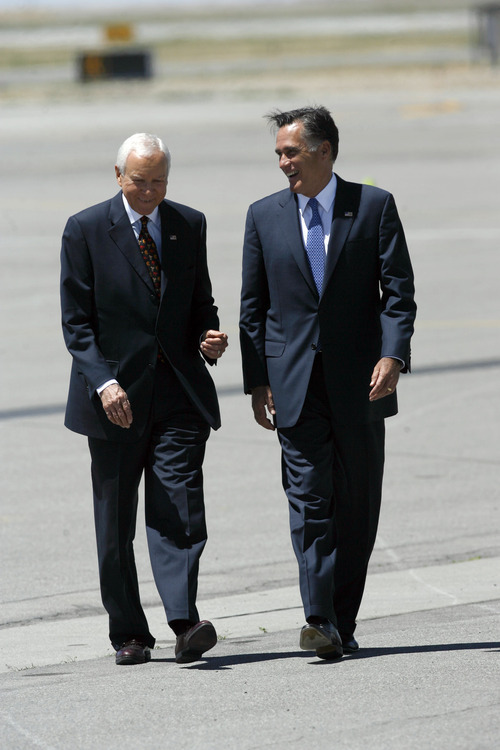This is an archived article that was published on sltrib.com in 2012, and information in the article may be outdated. It is provided only for personal research purposes and may not be reprinted.
If Mitt Romney is the Republican nominee, LDS apostle David A. Bednar purportedly said in February, his church would face persecution "more intense than any yet experienced in our lifetime."
An account of Bednar's remarks that surfaced from an unknown person in an audience of Mormon students at Dixie State College in southern Utah rapidly spread across the Mormon blogosphere and email lists.
By April, the summary had been distributed so widely that LDS Church education officials felt compelled to issue a disavowal, saying it was "distorted and inaccurate and should not be used, repeated, or passed on to others."
No matter what the apostle actually said, the question remains: Why did the supposed prediction of escalating hostility ignite such an intense reaction?
Observers say it's probably because today's Mormons still carry an inherited persecution complex, a condition exacerbated by some reporting on Romney and his faith now that the LDS candidate is sure to be the GOP nominee. After all, Mormons do retain a keen awareness of attacks from the faith's past.
The assassination of Mormon founder Joseph Smith, a Missouri governor's "extermination order" against members, the U.S. government sending an army to unseat their prophet as territorial governor — "these things left a deep imprint on the Mormon mind," says LDS historian Matthew Bowman, author of The Mormon People: The Making of an American Faith. "Mormons are exceptionally skilled at theologizing suffering, making the endurance of pain and adversity a source of spiritual growth."
In that sense, says Bowman, who teaches American religious history at Hampden-Sydney College in Virginia, "Mormons are proud of persecution."
Max Mueller, a Boston-based scholar who spent the last year studying Mormonism and race, agrees.
"Persecution has long been understood in Mormon history as a sign of chosenness," Mueller says in an email. "So Mormons both loathe persecution as a sign that they are not fully integrated into the American sacred community, and also love it, because it's a sign of their peculiarity."
But if you look at media coverage, Bowman says, today's articles and interviews are tepid compared to what was written about the Utah-based faith in the 19th Century.
"The newspapers of America in the 1880s were filled with leering exposes of Mormonism, persecution narratives from ex-Mormons, and the like," Bowman says. "This cycle I think Mormons have been made fun of and mocked. It's nasty, certainly, but this is hardly the persecution of the sort that threatened Mormon life or livelihood."
Mueller has seen some examples of "sensationalism, pure and simple" in some reports of Romney's Mormonism, but attributes it more to ignorance than hostility.
Latter-day Saints should not overreact to negative publicity, says Kristine Haglund, editor of Dialogue: A Journal of Mormon Thought.
"Mormons don't have a terribly sophisticated rubric for dealing with negative commentary, either from within or without the church," Haglund writes in an email from Boston. "So, for instance, we don't necessarily have a way of evaluating the nuance between [Pastor Robert] Jeffress' clearly political deployment of the word "cult" and the legitimate assertion that Mormonism is not Christian in the traditional, creedal sense."
In the same vein, many Mormons can't "distinguish the relatively good-natured teasing of 'The Book of Mormon' [the musical]," she says, "from the malicious mockery of [New York Times Columnist] Maureen Dowd or [literary critic] Harold Bloom."
To some, she says, "if it doesn't look like overt missionary work/testimony-bearing, we assume it must be 'anti-Mormon.' "
This attitude, Haglund says, is "largely a problem of a young religion — we're not far enough from the period of facing real and existential threats for the fight-or-flight instinct to have been recalibrated."
Angela Clayton, a Mormon blogger in Singapore, hopes that church members will use this so-called "Mormon moment" to view themselves in the world's mirror.
"The last thing we need is a bunker mentality that pits us against the world," Clayton writes in a blog post about Bednar's supposed prophecy about persecution at wheatandtares.org.
On the whole, she wrote, coverage of Mormonism has been even-handed.
"For every detractor, there have been supporters. For everyone treating what Mormons hold sacred lightly, there are those calling for tolerance and respect," Clayton writes. "And for everyone on the outside trying to make Mormons look bad, there are several on the inside doing a fine job of just that. Some of the best defenses of the church have been written by former and lapsed Mormons who are able to interpret LDS culture for a non-LDS audience in a way that promotes respect and understanding."
Such support should help Mormons alleviate the type of anxiety that Bednar's purported persecution statements generated.
Turning a well-known saying on its head, Clayton concludes, "He that is not against us is for us."
pstack@sltrib.com, Facebook.com/religiongal, Twitter:@religiongal



